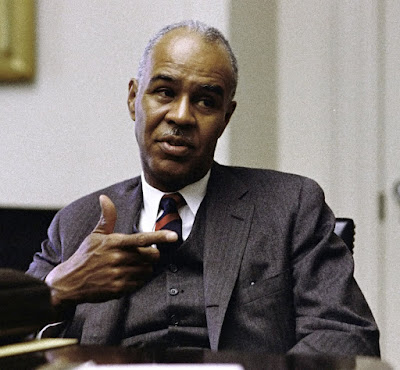Roy Wilkins was born on August 30, 1901, in St. Louis, Missouri. After his mother died when he was 4 years old, he and his siblings went to live with his aunt St. Paul, Minnesota. Wilkins enrolled at the University of Minnesota, majoring in sociology and journalism. He worked various jobs to support his way, including an editor for the university newspaper and the African-American periodical The St. Paul Appeal. Wilkins graduated from the school in 1923.
Wilkins moved to Kansas City in 1923, taking an editorial position with the Kansas City Call. He was confronted with the ferociousness of Jim Crow laws. He decided to engage in activist work, watching politicians who were known for their overt racism, He eventually moved to New York in 1931 to serve as assistant to Walter White, head of the National Association for the Advancement of Colored People (NAACP).
Working with the group's strong anti-lynching efforts, Wilkins also went undercover to observe and take part in the horrible job conditions African Americans worked under as part of a federally funded river initiative in Mississippi. His Mississippi Slave Labor report was instrumental in producing change for the workers.
By the mid-1930s, Wilkins had succeed W.E.B. Du Bois as editor of the NAACP's Crisis magazine, which Wilkins ran for a about 15 years. Later on, he was one of the key players in getting the 1954 Brown v. Board of Education case to the Supreme Court, whose ruling declared public school segregation illegal. In 1955, Wilkins was voted in as the NAACP's executive secretary, later known as executive director.
Wilkins continued his work as a pivotal figure in the Civil Rights Movement. He believed in achieving social equality through legislation and Constitutional backing, and during speeches, urged African Americans to embrace US citizenship. He went on to become an advocate of black-owned bank lending power and met with various US presidents, including John F. Kennedy and Lyndon B. Johnson, to advocate on his constituency's behalf.
Wilkins was also an instrumental figure in Congress' passing of the Civil Rights Acts and the Voting Rights Act, and was one of the key leaders in organizing the historic March on Washington. In 1968, he also served as chair of the U.S. delegation to the International Conference on Human Rights. But Wilkins was wary of the more militant Black Power Movement, and was accused by some of having too conciliatory a tone. After being asked to step down by some within the organization and initially refusing, he retired from the NAACP in 1977.
Roy Wilkins died on September 8, 1981, in New York City, due to kidney failure and heart issues. He received many awards and honors during his lifetime. In 1964, he was awarded the Spingarn Medal from the NAACP and in 1967, Wilkins was awarded the Presidential Medal of Freedom by Lyndon Johnson. In 1992, the University of Minnesota created the Roy Wilkins Center for Human Relations and Human Justice.

No comments:
Post a Comment